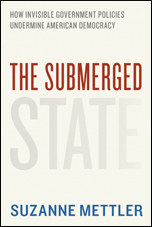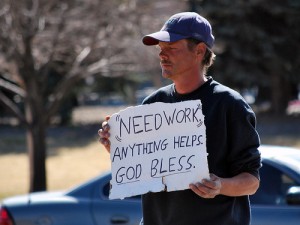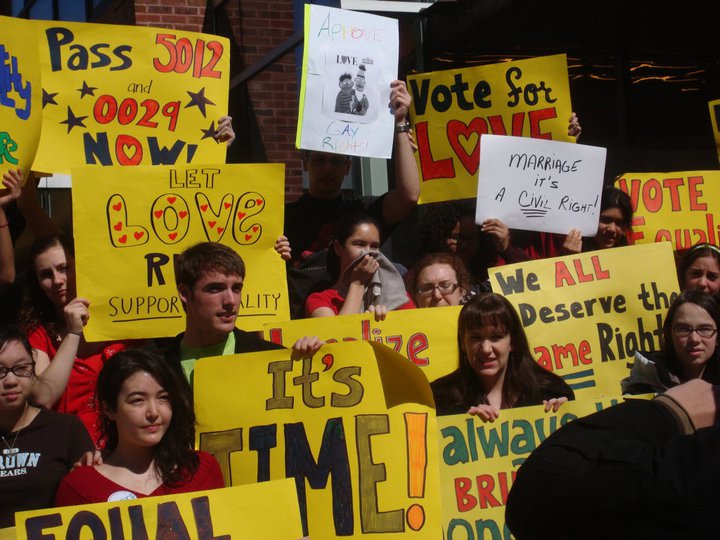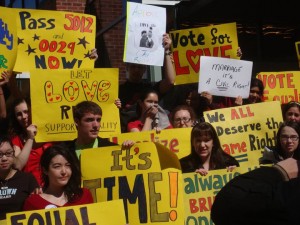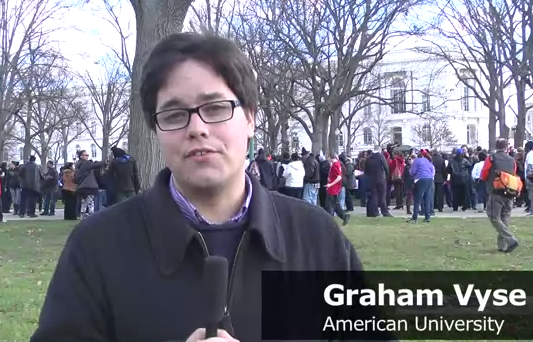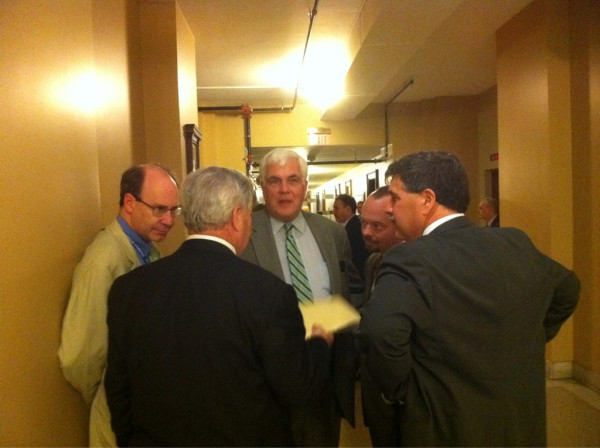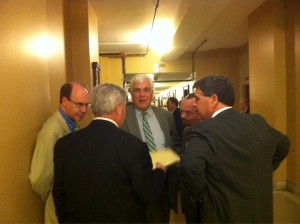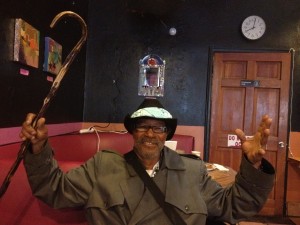 In the wake of another tragedy, calls for gun regulation rises again. Many citizens do not tend to “wait and see” what the politicians will do, and many expect a little saber-rattling and then see their elected officials bow down to the powerful pro-gun lobbyNational Rifle Association. People have already begun targeting the NRA as a pressure point for the problem of gun violence. There are four key factors to consider when going after the NRA.
In the wake of another tragedy, calls for gun regulation rises again. Many citizens do not tend to “wait and see” what the politicians will do, and many expect a little saber-rattling and then see their elected officials bow down to the powerful pro-gun lobbyNational Rifle Association. People have already begun targeting the NRA as a pressure point for the problem of gun violence. There are four key factors to consider when going after the NRA.
1. The NRA provides political cover for profiteers.
The NRA is designed to absorb public pressure. As a member-based public relations group, they routinely deal with all manner of the public, can rally “card carrying members,” and have a sit-down with any politician they like. The NRA has many members who served this country, who died for this country, and currently serve in a law enforcement or political capacity. The Second Amendment is a fundamental principle of America, and open to debate as to how far we extend the right to own a gun. Those who believe it is only for hunting are neglecting the concern our Founding Fathers had of a federal government that disarms the citizenry.
Many Americans have no problem with the vast majority of guns the 2nd Amendment protects. Although most pistols are now semi-automatic with about 15-round clips, the greatest outrage is against the semi-automatic assault rifles such as the Bushmaster AR-15. Bushmaster, by the way, operates in relative obscurity- free of criticism, protest, and public pressure. They provide jobs at their factory in upstate New York. They do not even provide a public statement when one of their weapons is used in a massacre of elementary school children.
Most Americans are not aware that Bushmaster is one of multiple weapons manufacturers bought up by Cerberus Capitol Management, and merged into a company called Freedom Group. Cerebrus is a private equity firm that will pool the wealth of those with excess wealth, and make investments they believe will continue to profit. Therefore, Cerberus believed that Bushmaster, and the AR-15 was a good investment. In the history of protest and change, businesses are far less “armed” to handle public pressure than ideological groups.
This week Cereberus made the announcement that they will sell Freedom Group. This underscores the point that markets are only viable to the level that the public permits. As Cerebrus states:
“Our role is to make investments on behalf of our clients who are comprised of the pension plans of firemen, teachers, policemen and other municipal workers and unions, endowments, and other institutions and individuals. It is not our role to take positions, or attempt to shape or influence the gun control policy debate. That is the job of our federal and state legislators.”
Part of this statement is misleading, where Wall Street are the largest donors to politicians and the Citizens United ruling held that any firm can make any independent ad to attempt to shape or influence any debate. Former Vice-President Quayle is a key director at Cerberus. Whereas weapons manufacturers have played a significant role in the policies being as they now are, Cerberus would like to point the finger at our legislatures alone.
2. Economic power motivates more politicians than ideological power.
The USA is the top weapons exporter in the world. Even if we exclude the weapons of mass destruction that are traditionally only sold to governments (or bought with taxpayer funds and then gifted to others), America exports far more small arms than other nations. Combine that with the amount of guns bought annually per year by Americans, and we have an entire industry at stake.
Those who are insistent upon massive curtailing of arms manufacturing in America are up against the Third Rail: “Jobs.” Even reductions in crime that reduce the need for prisons have had a difficult time putting a prison guard out of work. Much of the Military Industrial Complex is about jobs. This point is not meant to shut down the ideological and moral arguments against manufacturing and selling weapons. Instead, the point is to recognize the realities of America’s stake in the game.
3. The NRA is legitimized by the Supreme Court, not campaign contributions.
When the Supreme Court thoroughly argued D.C. v. Heller, and then later held that theSecond Amendment also applied to the state governments, most people would be surprised that the Court took this long to dig down deep into what this right entails. In 2007, the Heller decision marked the first time in 70 years that this right came up for debate. In many ways, that is a good thing- because we are deep into our “The Right to Own a Gun” is outmoded, due to technology. I won’t rehash the debate here, but it is a good one, with multiple perspectives from America’s top jurists.
Those wishing to engage in such a debate about the Second Amendment would be aided in reading all the Opinions, as there may be rationales that sound legitimate, or un-American, or inspire new ideas. The constitution can be amended, laws can be passed around the edges, and different Courts can have different interpretations on the language. But a meaningful discussion needs to start somewhere, preferably in our founding principles, if we are to uphold the democracy of America.
4. Gun control can be a red herring to systemic issues of violence.
It is true that a federal ban on assault weapons was passed in 1994. In 1996, AEDPAcreated further limitations on weaponry sales (in the wake of the bombing of the Murragh federal building). The federal ban expired in 2004, and was not considered important enough to renew. It was a flimsy piece of legislation, easily evaded. Practically any weapon that would have been banned has a close counterpart that is legal. Such feel-good legislation is certainly not going to have any practical impacts.
To have a genuine impact on present and future gun ownership, massive prohibitions must be put in place. Furthermore, the government may need to confiscate high-capacity, high-velocity, high-caliber weapons. Setting aside the difficulty with such a route, let us assume it is possible…
Gun ownership is an effect. Violence is an effect. There are internal and external forces that propel most decisions we make in life, even most reactions we make- as we have been conditioned to react. Many shooting deaths in America involve drugs: either drug dealers settling disputes or drug users in search of money to get their drugs. For those people, most guns are gotten from an illicit market among the millions of guns already in America. Many of their guns are small and cheap, sometimes not working properly. Regulation is unlikely to have any impact. The causes are some combination of addiction, desperation, anger, and inability to see (or choose) a more peaceful way to their goal.
The cynic would argue that Americans don’t care about the “street” criminal (insert racial analysis here). What they care about are the killings that impact White middle-class America. Columbine, Virginia Tech, Aurora, Newtown are all etched in our conscience, as they should be. Setting aside the racial and class contexts, the point remains: it isn’t gun ownership that caused the shooters to “go postal” (as we used to say). There is some validity to “guns don’t kill people, people kill people.” And it is heartening to know that the Obama Administration has announced that his Task Force will focus on mental health and education, in addition to gun regulation. We are not likely to hear such public dislike of teachers as we have in recent years, and it should stay that way (in my opinion).
Perhaps the unfortunate reality is that we have developed a very violent culture in America, built on the foundations of revolution, the Wild West, slavery, and an awkwardly-settled Civil War. Our movies, books, video games, news and TV shows feed off the mantra “If it Bleeds, it Leads.” The choice to tear down and destabilize our attempts to help Americans who are struggling with mental health comes with repercussions. The savings in closing down mental hospitals has helped fuel a costly prison explosion. The challenge for people getting coverage for mental health treatment also creates other costs. Until we can look at the savings and costs in a holistic manner, we will continue to be baffled by systemic troubles and occasional travesties.
In a final thought, I hope there are survivors of other tragic events, such as students of Columbine or during Katrina, who have developed tools to share with the kids, parents, teachers, and neighbors of Newtown. It may not be for a while, but people should prepare for the worst PTSD imaginable.
I have been on all sides of this issue. My family includes small children, teachers, military, mentally ill people, and gun owners. Those who kill, including myself, and those who have been killed. I have worked with mental health and substance abuse professionals, regarding expanding treatment. I have strategized in achieving political goals. There are many worthwhile and intelligent opinions on the matter of guns and violence. My hope here is that discussions are meaningful and vibrant, not just wars of words.
 I’ve been a good boy this year, so before I sign off of work until 2013, I’ll throw a couple of wishes out there, pebbles into the pool of human consciousness to see what the ripples bring back, if you will.
I’ve been a good boy this year, so before I sign off of work until 2013, I’ll throw a couple of wishes out there, pebbles into the pool of human consciousness to see what the ripples bring back, if you will.



